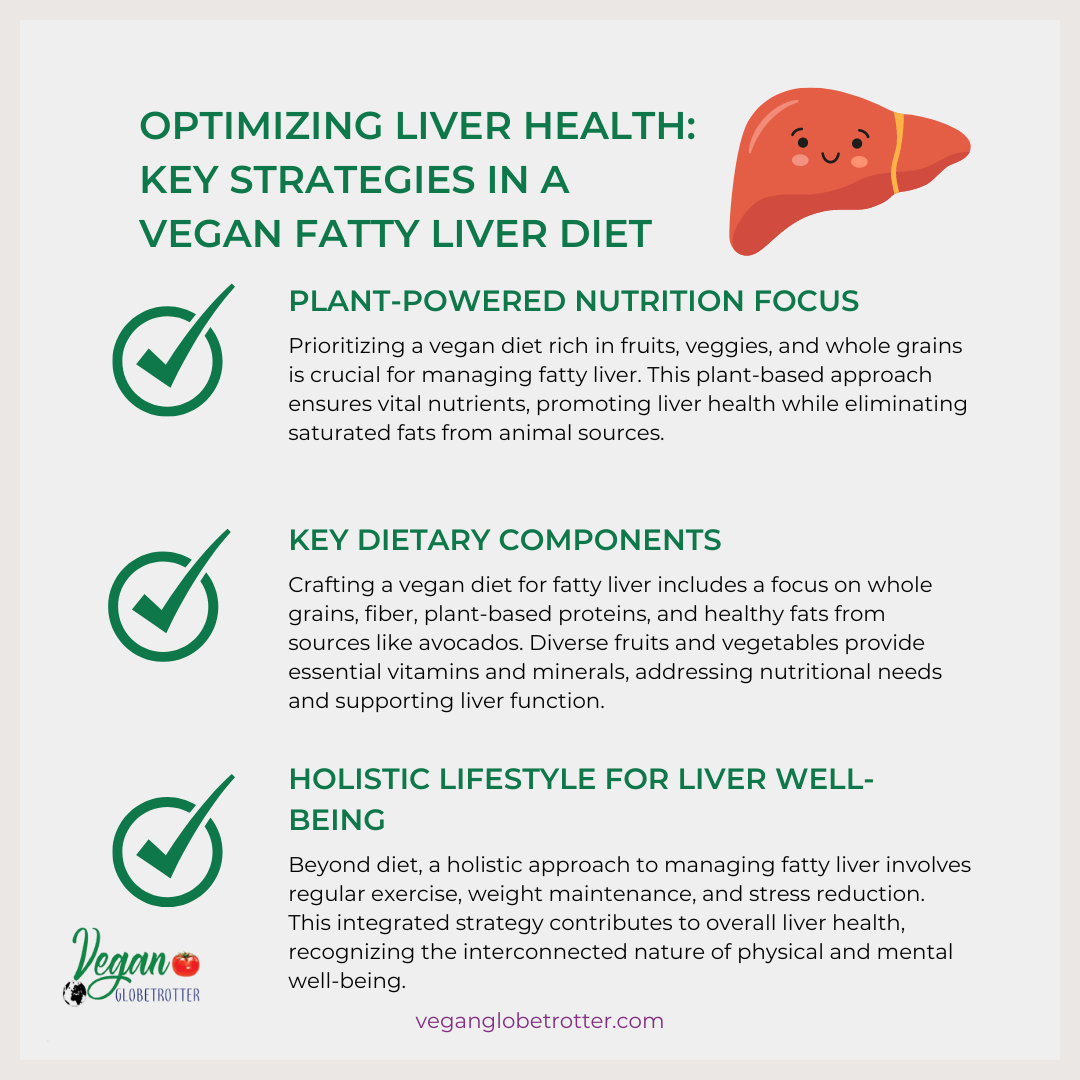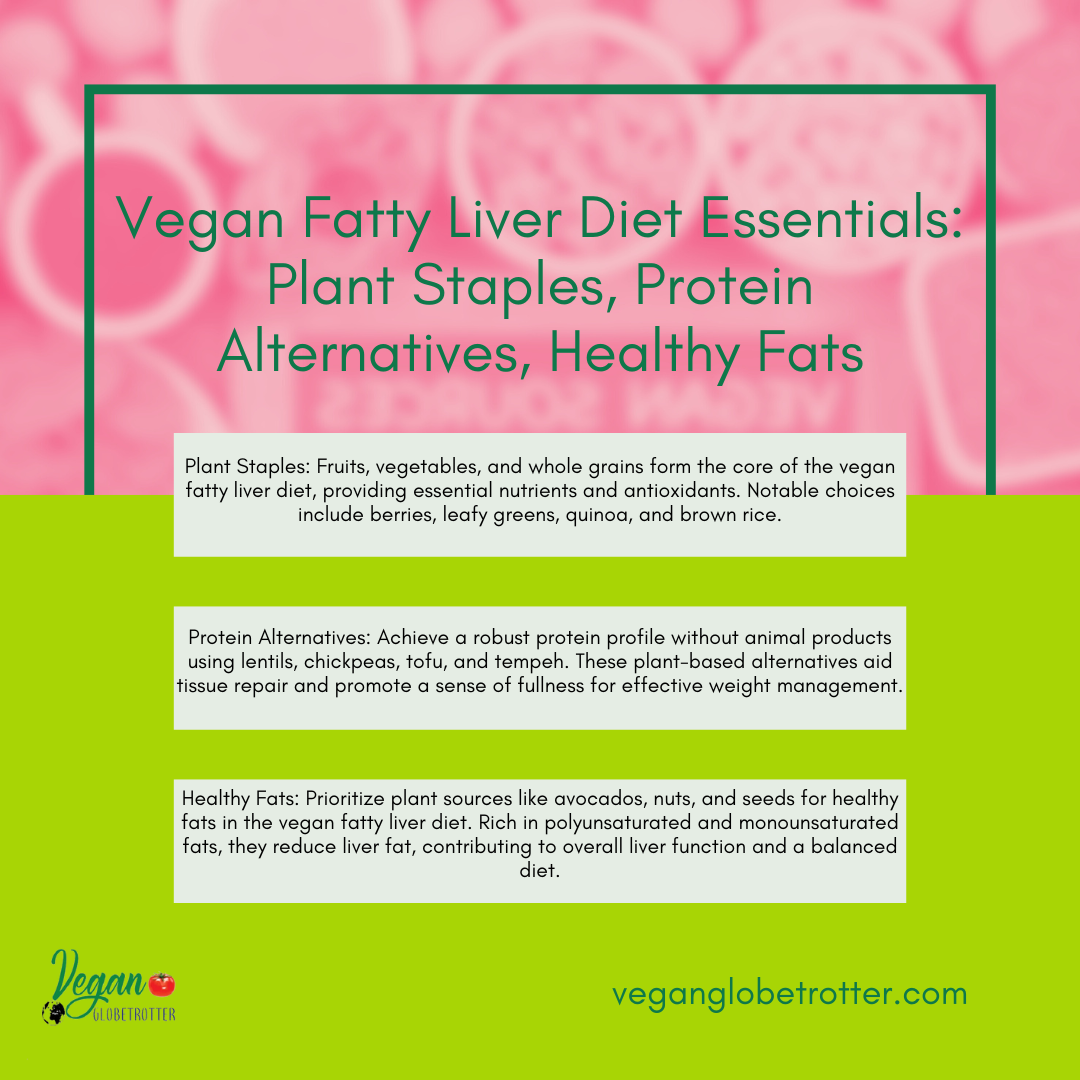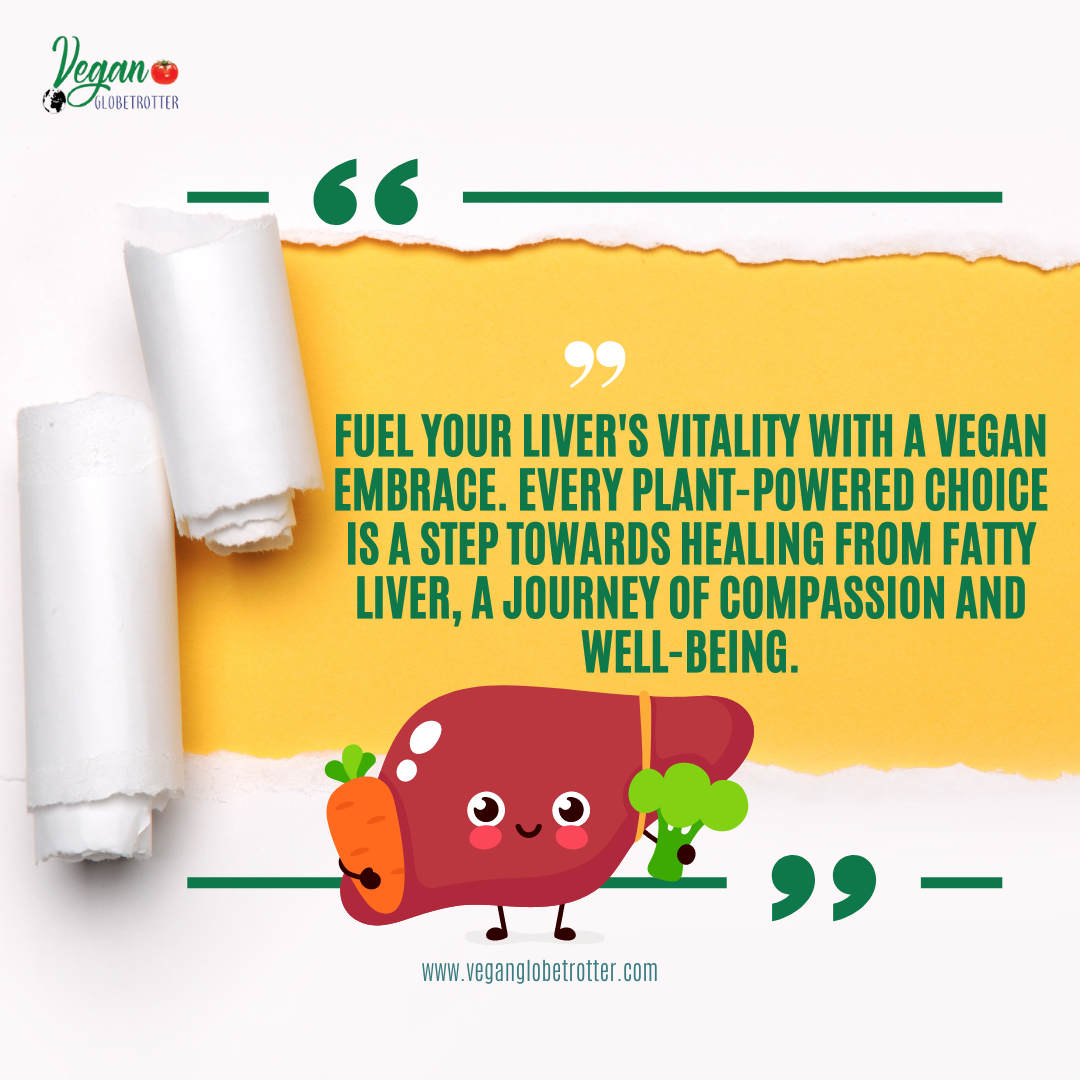Vegan Globetrotter is supported by our audience. When you purchase through one of our links, we may earn a small affiliate commission. As an Amazon Associate I earn from qualifying purchases. Your cost is not affected.
==================
Adopting a vegan fatty liver diet for managing fatty liver disease is a strategy that has gained attention in the health community. A fatty liver occurs when excess fat is accumulated in the liver cells, a condition that can be influenced by diet and lifestyle.
Vegan diets, which exclude all animal products, can be rich in fruits, vegetables, and whole grains. These are foods that are beneficial for liver health. They naturally eliminate the intake of saturated fats from animal sources, a recommended dietary change for those with fatty liver disease.
Fatty Liver Diet Vegan Guide: Optimize Liver Health with Plant-Based Choices
Transitioning to a vegan diet can offer a range of benefits for those looking to improve their liver function. Research suggests that plant-based diets can help reduce the risk factors associated with fatty liver, including obesity and cholesterol levels, by focusing on nutrient-dense foods and minimizing the intake of processed and high-fat foods.
Careful meal planning is essential to meet all nutritional needs, particularly those nutrients more readily available in animal products.

Key Takeaways
- Vegan diets high in fruits, vegetables, and whole grains may benefit liver health.
- Eliminating animal products can reduce saturated fat intake, supporting fatty liver management.
- Effective meal planning is crucial to meet the nutritional needs of a vegan diet.

Understanding Fatty Liver Disease
Fatty liver disease is characterized by the build-up of fat in the liver, affecting a significant portion of the global population. This section explores its definition, causes, prevalence, and types.
Definition and Prevalence
Fatty liver disease (FLD), also known as hepatic steatosis, is a condition in which excess fat accumulates within liver cells, making up more than 5% of the liver’s weight. It is one of the most common chronic liver conditions worldwide. Nonalcoholic fatty liver disease (NAFLD), a subset of FLD, affects nearly 25% of the global population, demonstrating its widespread prevalence.
Causes and Risk Factors
Several factors influence the development of fatty liver disease. Major contributors include:
- Obesity: An increased body mass index (BMI) is closely linked to excess fat deposition in the liver.
- Insulin resistance: This condition impairs the body’s ability to handle glucose and is commonly associated with type 2 diabetes.
- High cholesterol and triglycerides: Elevated lipid levels contribute to fat accumulation in the liver.
- Metabolic syndrome: This cluster of conditions, including hypertension, hyperglycemia, abnormal cholesterol levels, and abdominal fat, escalates the risk.
- Environmental and genetic factors also play a role, though their exact contribution to FLD is still being researched.
Types of Fatty Liver Disease
FLD is classified mainly into two types:
- Nonalcoholic Fatty Liver Disease (NAFLD): This type occurs in individuals who consume little to no alcohol and is divided into simple fatty liver and nonalcoholic steatohepatitis (NASH), the latter of which can lead to cirrhosis.
- Alcoholic Fatty Liver Disease (AFLD): As the name suggests, AFLD is due to excessive alcohol consumption and can progress to alcoholic hepatitis and cirrhosis if consumption continues.
Basics of a Vegan Diet for Fatty Liver
Adopting a vegan diet for fatty liver can help reduce the intake of saturated fats and increase the consumption of nutrient-dense foods, which are essential for liver health.
Principles of Veganism
The vegan diet excludes all forms of animal products, including meat, dairy, and eggs. Instead, it emphasizes plant-based foods such as fruits, vegetables, grains, legumes, nuts, and seeds. For individuals with fatty liver disease, it’s particularly important to focus on whole foods and minimize processed items that often contain harmful trans fats and added sugars.
Potential Benefits for Liver Health
Switching to a vegan diet may offer significant benefits for those with fatty liver disease. This dietary approach promotes the intake of fiber and antioxidants, which support liver function and reduce liver inflammation. Additionally, studies suggest that a plant-based diet can improve insulin sensitivity and aid in weight management, key factors in managing and improving nonalcoholic fatty liver disease.

Dietary Components to Focus On
Adhering to a vegan diet for the management of nonalcoholic fatty liver disease involves incorporating a variety of plant-based foods that are rich in essential nutrients. Below are key components that should form the foundation of a fatty liver-friendly vegan diet.
Whole Grains and Fiber
Whole grains are a cornerstone of the vegan diet, providing essential carbohydrates for energy and necessary dietary fiber. High-fiber foods, such as brown rice, quinoa, and oats, help maintain digestive health and can aid in weight management. Research suggests a diet rich in fiber and whole grains may reduce liver fat.
Plant-Based Proteins
Proteins are vital for tissue repair and muscle health. Options for plant-based proteins include lentils, chickpeas, tofu, and tempeh. These foods are also beneficial as they provide a sense of fullness, which can help control calorie intake.
Healthy Fats
Not all fats are equal, and focusing on healthy fats that support liver health is crucial. Other foods, such as avocados, nuts, and seeds, contain polyunsaturated and monounsaturated fats, which can help reduce liver fat. Including polyunsaturated fats in the form of these plant sources is recommended to support overall liver function.
Vitamins and Minerals
A vegan diet for fatty liver disease should include various fruits and vegetables high in vitamins and minerals, which support liver health and immune function. Dark leafy greens and brightly colored fruits are particularly rich in these nutrients.
For example, spinach and kale contain vitamin K, while oranges and berries provide vitamin C and antioxidants. It’s beneficial to incorporate diverse produce to ensure an adequate intake of all vitamins and minerals.

Foods to Avoid or Limit
When adhering to a vegan diet for managing fatty liver disease, certain plant-based foods high in fats and heavily processed items, such as alcohol and sugary beverages, should be consumed with caution or avoided altogether to support a healthy liver.
High-Fat Plant Foods
Some plant-based foods are high in fat and should be limited. These include:
-
Oils such as coconut oil and palm oil
-
High-fat nuts like macadamias
-
Avocados and olives, in moderation
Processed Vegan Foods
Processed vegan foods often contain added sugars, sodium, and unhealthy fats. They typically have little nutritional value and can contribute to liver fat accumulation. Items to limit or avoid include:
- Vegan cheese alternatives
- Meat substitutes that are high in processing
- Vegan desserts and snacks
Alcohol and Sugary Beverages
Alcohol consumption can exacerbate liver conditions, and its avoidance is crucial in managing fatty liver disease. Moreover, sugary beverages like soda and certain fruit juices are high in fructose, which can directly contribute to liver fat. They should be avoided to prevent further liver damage.
Meal Planning and Preparation
Successful meal planning for a vegan diet aimed at managing fatty liver involves careful consideration of nutrient intake and meal balance.
Balancing Macronutrients
Each meal should provide a balance of carbohydrates, proteins, and healthy fats to ensure nutritional adequacy. Carbohydrates can be sourced from vegetables, fruits, and whole grains.
Legumes, tofu, and tempeh are excellent protein options, while avocados, nuts, and seeds provide beneficial fats. For individuals with fatty liver disease, increased intake of healthy foods like fruits and vegetables is particularly important.
Sample Meal Ideas
Breakfast might include oatmeal made with almond milk, topped with chia seeds, and fresh berries for a mix of complex carbs, protein, and fats. Lunch could be a quinoa salad with mixed greens, chickpeas, cucumbers, and a tahini dressing.
For dinner, a lentil stew with various vegetables and brown rice can be filling and nutritious. Snack options include carrot sticks with hummus or an apple with almond butter. Prepping meals in advance ensures that a balanced plate is always accessible.
For more information about whole foods and meal preparation, visit Vegan Meal Prep Ideas and Tips for Fatty Liver Disease.
Lifestyle Considerations
When adopting a vegan diet for managing fatty liver disease, it is essential to consider the broader lifestyle changes that can enhance overall liver health. Exercise, body weight management, and stress reduction play critical roles.

Exercise and Weight Management
Regular exercise is a key factor in promoting liver health for individuals with fatty liver disease. A structured routine combining cardiovascular activities and resistance training can help lose body weight and reduce liver fat.
According to studies mentioned by the Physicians Committee for Responsible Medicine, a vegan diet improves liver function in patients with nonalcoholic fatty liver disease (NAFLD), and physical activity is also instrumental in synergistically furthering these benefits.
- Cardiovascular Activities: Include brisk walking, swimming, or cycling for at least 150 minutes weekly.
- Resistance Training: Integrate strength-building exercises like weight lifting or yoga twice weekly.
Maintaining a healthy weight through healthy diet and exercise can directly impact the severity of fatty liver disease.
Stress Reduction Techniques
Stress is often an overlooked aspect of managing NAFLD, yet its reduction is vital for liver health. Techniques such as mindful meditation, deep breathing exercises, or yoga positively influence stress levels.
A report from Vegan Food and Living discusses the inclusion of antioxidant-rich whole plant-based foods as part of a liver fatty diet, emphasizing that the same mindfulness applied to dietary choices should be mirrored in techniques to manage stress.
-
Mindful Meditation: Dedicate a few minutes each day to focus on present-moment awareness.
-
Breathing Exercises: Practice deep breathing to help lower stress hormones in the body.
Monitoring and Adapting the Balanced Diet
When managing nonalcoholic fatty liver disease (NAFLD) via a vegan diet, close observation and ongoing adjustments are crucial. This approach helps ensure the diet meets individual nutritional needs while promoting liver health.
Regular Health Check-Ups
Individuals should schedule regular health check-ups to track their liver function and overall health progress. These check-ups might include liver enzyme tests and evaluations of other metabolic markers. Consistent monitoring by a healthcare professional can confirm the diet’s effectiveness in managing NAFLD and identify when further dietary adjustments might be necessary.
Adjusting the Diet as Needed
A vegan diet for someone with fatty liver should be rich in whole plant-based foods and low in processed foods. Based on health check-ups and individual responses, dietitians may recommend increasing specific nutrient-intense foods or supplementing to ensure adequate nutrient intake.
For instance, adjustments may be made to ensure sufficient intake of essential omega-3 fatty acids, vitamins, and minerals, which can sometimes be lower in vegan diets. Making these iterative changes helps to maintain the diet’s balance and nutritional completeness.
Wrapping It Up
A vegan diet can help manage fatty liver. Focus on whole foods, like fruits, vegetables, and grains. Avoid processed foods and alcohol. Drink plenty of water.
Regular check-ups with a healthcare professional are crucial. Remember, healthy choices support liver health. Embrace a plant-based diet for a healthier liver!

FAQs
What plant-based foods are recommended for reversing fatty liver?
Individuals with fatty alcohol related liver disease may benefit from a diet rich in fruits, vegetables, whole grains, and legumes. Foods high in antioxidants and fiber, such as leafy greens and berries, have been shown to support liver health.
How can a vegan diet support liver health and potentially reverse cirrhosis?
A vegan diet, which excludes animal products, can reduce the intake of saturated fat and cholesterol. Studies have indicated diets high in plant-based foods can improve liver enzyme levels and may have the potential to positively impact liver fibrosis.
What are some effective vegan recipes that can help manage fatty liver disease?
Incorporating recipes with whole foods low in added sugars and processed ingredients can be effective. For example, lentil stews and quinoa salads are nutritious options that align with liver-friendly vegan diets.
What should be avoided in a vegan diet to prevent exacerbating fatty liver?
Patients should steer clear of refined sugars, processed vegan foods, and excessive amounts of fats, even if plant-based. These can contribute to weight gain and metabolic issues that can worsen liver health.
Are there particular nutrients in a vegan diet beneficial for liver disease patients?
Yes, nutrients such as omega-3 fatty acids, which can be found in flaxseeds and walnuts, and silymarin, present in artichokes, may offer liver-protective effects.
Learn Vegan Cooking With Us!
Discover the various vegan dishes with Vegan Globetrotter. Learn aromatic and appetizing vegan dishes that blend flavor, health, and simplicity. Stay connected and enhance your vegan cooking skills:
- Facebook: Vegan Globetrotter
- Instagram: @_veganglobetrotter
- Pinterest: The Vegan Globetrotter
- Twitter: @VeganGlobetrot
Join our community and explore the wonders of vegan cooking! For more insights into the world of vegan cooking, visit our website: veganglobetrotter.com


Don't miss out
when new recipes and information are added!
Join our newsletter for free recipes,
healthy living inspiration, and special offers
You have Successfully Subscribed!